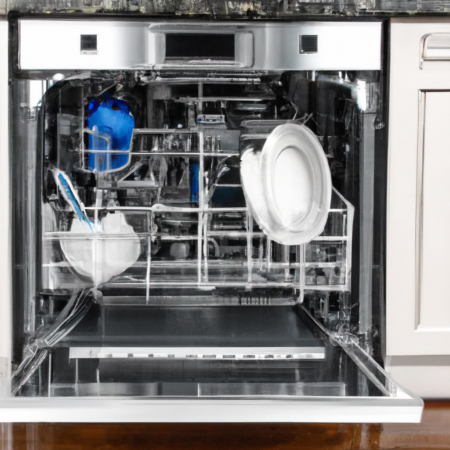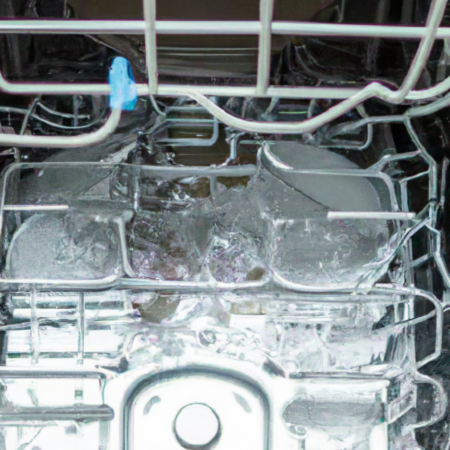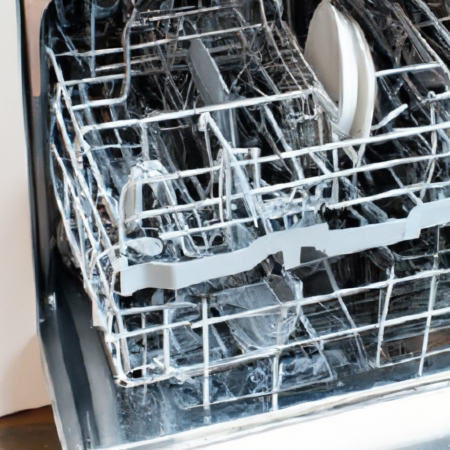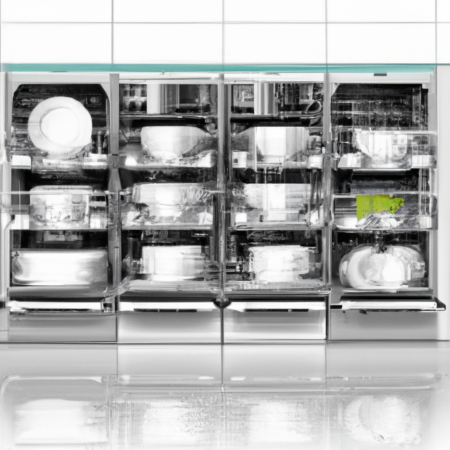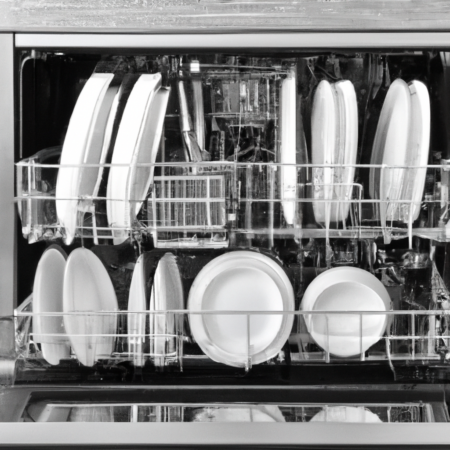Dishwashers are a great appliance that takes the load off your shoulders and gets your dishes sparkling clean. Washing dishes by a dishwasher is much more convenient and time-saving than washing the dishes by hand. In general, hand-washing and rinsing dishes uses more water than cleaning an equivalent number of dishes in a dishwasher.

This implies that using a dishwasher saves both water and power. Another advantage of using a dishwasher is that it is simpler. Dishwashers use much less water and come in handy while saving water.
To help you conserve more water, we will share 10 easy ways in which you can save water while using your dishwasher in this article.
Does A Dishwasher Consume Lots of Water
Ever wonder if you are wasting water by using your dishwasher? Well, In actuality, a dishwasher uses less water and is more efficient than handwashing dishes, saving you both money and time. A dishwasher cycle requires about 12 liters of water on average.
The average American family consumes roughly 90 gallons of water per day in the home, and each American household consumes approximately 107,000 gallons of water per year. In reality, lawn and garden watering consumes 50-70 percent of residential water.
Surprisingly, approximately 14 percent of the water paid for by an average family is never used—it just seeps down the drain. The average dishwasher consumes 6 gallons of water per cycle; the average energy-efficient dishwasher uses 4 gallons per cycle, with energy consumption ranging from 1.59 kWh per load to 0.87 kWh per load.
In short, a modern, more efficient dishwasher is more environmentally friendly than washing your dishes by hand, especially if you take some extra precautions to reduce water use. Owning a newer, more water-efficient model and using it in an environmentally friendly manner is definitely a good start towards water conservation.
10 Easy Tricks to Save Water
Dishwashers have a variety of advantages over hand cleaning, including saving time and water, as well as being extremely sanitary. Furthermore, you will not only save water, but you will also save electricity, as 80 percent of the energy needed by a dishwasher goes toward water heating.
Here are 10 tips and tricks in which you can decrease water consumption while using a dishwasher.
1- No Pre Rinse
The easiest way to save water while using a dishwasher is to not rinse your dishes before putting them into the dishwasher. To clean all the dirty dishes, use a damp sponge or napkin. Scrap and remove any food scraps on the dishes with a fork.
If necessary, pre-soak any extremely filthy dishes in a bowl rather than rinsing them under the faucet before beginning your washing.
However, most dishwashers nowadays are strong enough to remove all filth, doing a lot of pre-rinsing by hand is frequently a waste of water and effort. This way, you can avoid wasting excess water and promote water conservation.
2- Full Load Setting
Before running your dishwasher, wait for it to fill up completely. Don’t run your dishwasher at half load, instead, use it at its maximum capacity. Wait until your dishwasher is full before selecting an eco or water-saving cycle to save water, electricity, and money on operating expenses.
Using your dishwasher at its full load setting will not only save even more water but will also conserve energy and detergent.
3- Correctly Loading the Dishwasher
It is possible that you are wasting even more water by loading your dishwasher the wrong way. Even the way you load your dishwasher might help you save water. While it should be fully loaded, be careful not to overfill it, since this may prevent some things from being adequately cleaned.
Huge objects should be loaded towards the rear and sides of the racks to reduce the likelihood of having to wash them again. If large plates are loaded at the front, the water will not reach the detergent dispenser.
Here’s how to load your dishwasher correctly!
4- Air Drying
One of the many easy ways to save water and energy is to let the dishes be air-dried after washing. After a running, wash cycle, let the dishwasher gate open and allow the washed dishes to air dry instead of allowing your washer to dry the dishes with electric heat or a fan.
If the door is left open after the wash and rinse cycles, the water in most dishwashers is hot enough to evaporate fast. Instead of utilizing the heat drying cycle, you may save roughly 15% of total dishwashing energy by using this approach.
5- Getting The Correct Dishwasher
To reduce water consumption, you need to select the right kind of dishwasher. Get the water-efficient models of dishwashers that reduce water usage by a spectacular margin.
One load of dishes when hand washed consumes about twenty gallons of water whereas water-efficient dishwashers utilize as low as five gallons of water per load.
6- Maintaining Your Dishwasher
Check for clogs, damaged components, and other issues on a regular basis. This will save you water by allowing you to clean your dishes more efficiently. If you need to replace it, choose a model that is both water and energy-efficient to save even more water.
7- Garbage Disposal
Reduce your use of the garbage disposal increase your use of the garbage, and scrape food residue off dishes before washing them. Better yet, compost those scraps.
8- Utilising Used Water
The key to saving water is to reuse used water in one way or the other. You can use the drain water from the dishwasher to water plants. You can also fill the toilet tank with the drained dishwasher water. You can run the dishwasher wash cycle by using collected rainwater. This way, you can conserve lots of water and prevent climate change.
9- Right Sized Dishwasher
Choose the right size of the dishwasher according to your needs. Preferably, a compact dishwasher uses much less water than a bigger one. If you have a lot of dirty dishes then you must get a bigger dishwasher to avoid running several wash cycles per day.
10- Lower The Heat
Booster heaters are used in most modern dishwashers to heat the water that comes from your home’s water tank. Lowering the water tank’s temperature to 65 degrees leads to extra energy savings while maintaining cleanliness.
Conclusion
In conclusion, It is much more efficient and convenient to wash dishes using a dishwasher instead of washing them by hand. A dishwasher helps conserve water as it uses much less water per wash cycle. You can further minimize water usage by following the tricks mentioned in this article.
According to recent research, a typical person takes roughly 15 seconds to hand-wash a plate. The sink uses half a gallon of water during that period (a typical faucet spouts four gallons of water every two minutes). In comparison, an Energy Star-certified dishwasher consumes less than four gallons every cycle, so running a load with as little as eight dishes may conserve water.










